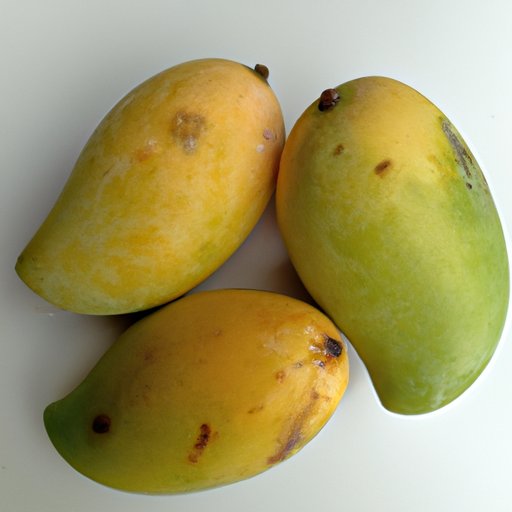
I. Introduction
Mangoes are delicious, juicy, and packed with nutrients. However, if you’ve never eaten a mango before, it can be a daunting task! In this article, we’ll cover everything you need to know about eating and enjoying mangoes, from a step-by-step guide for cutting them, to the many health benefits of this tropical fruit.
II. Step-by-Step Guide
Cutting and eating a mango can be messy and complicated if you don’t know how to do it properly. Here’s our step-by-step guide:
- Wash the mango and pat it dry
- Stand the mango on its end, with the stem facing up
- Using a sharp knife, slice off the sides of the mango, cutting as close to the pit as possible
- Cut off any remaining flesh from around the pit
- Score the cut sides of the mango in a criss-cross pattern, being careful not to cut through the skin. Then, use a spoon to scoop out the flesh
Alternatively, you can cut the mango in half, lengthwise, and remove the pit. Then, scoop out the flesh with a spoon.
Mangoes can be quite juicy and messy to eat, so it’s a good idea to have some paper towels or a napkin handy. Don’t worry too much about the mess, though – it’s part of the fun!
III. Health Benefits of Mangoes
Mangoes may be delicious, but they also offer a range of health benefits. They are a great source of vitamins A and C, as well as antioxidants, which help to protect the body from free radicals. Mangoes are also high in fiber, which aids digestion and helps keep you feeling full for longer.
Eating mangoes regularly can also help to boost your immune system, lower your risk of cancer, and even improve your skin health. If you’re looking to incorporate more mangoes into your diet, try adding them to smoothies, salads, or as a topping for yogurt or granola.
IV. Mango Recipes
Mangoes are versatile and can be used in many different recipes. Here are a few delicious ideas:
Mango Salsa
This fresh and zesty salsa is perfect for summer grilling or as a dip for chips and crackers. Here’s what you’ll need:
- 1 large ripe mango, diced
- 1/2 small red onion, diced
- 1/2 jalapeno, seeded and diced
- 1 lime, juiced
- Salt and pepper to taste
Mix all the ingredients in a bowl, and chill for at least an hour before serving.
Mango Smoothie
A mango smoothie is a delicious and refreshing way to start your day. Here’s how to make one:
- 1 large ripe mango, peeled and diced
- 1 banana, peeled and sliced
- 1 cup almond milk
- 1 tsp honey
- Ice cubes (optional)
Blend all the ingredients in a blender until smooth. Serve immediately.
Mango Coconut Rice Pudding
This sweet and creamy dessert is perfect for entertaining or enjoying as a special treat. Here’s what you’ll need:
- 1 cup short-grain rice
- 1 can coconut milk
- 2 cups water
- 1/4 cup sugar
- 1 tsp vanilla extract
- 1 large ripe mango, diced
Combine the rice, coconut milk, water, sugar, and vanilla extract in a saucepan. Bring to a boil over medium-high heat, then reduce the heat to low and simmer for 20 minutes. Once the rice is cooked, add the diced mango and stir well. Serve chilled.
V. Mango Varieties
There are many different varieties of mangoes available, each with their own unique characteristics. Here are a few popular varieties:
- Ataulfo: These small, yellow mangoes are sweet and creamy, with a rich flavor.
- Haden: This is one of the most common varieties of mangoes found in the United States. It has a sweet, juicy flesh and is often used in baking or in salads.
- Keitt: These large, green mangoes have a sweet flavor and are often used in chutneys or as a topping for ice cream.
When selecting a mango, try to find one that is ripe but not overripe. Look for a mango that is slightly soft to the touch and has a fruity aroma. If the mango is too firm, it is not yet ripe. If it feels mushy or has brown spots, it is overripe.
VI. How to Cut a Mango
Cutting a mango can be intimidating, but with a little practice, it’s easy to do. Here are a few tips:
- Always use a sharp knife to cut your mango. A dull knife can make the process more difficult and increase the risk of injury.
- Use the “hedgehog” method if you want to dice the mango: Start by cutting off the two ends of the mango, then score the flesh in a criss-cross pattern, without cutting through the skin. Then, push the skin side up, so that the flesh protrudes, and cut the cubes away from the skin with a knife or spoon.
- Use the “cheeks” method if you want to get two large slices of mango: Start by slicing off the two sides of the mango, as close to the pit as possible. Then, score the flesh in a criss-cross pattern and enjoy the fruit right off the skin.
VII. Conclusion
Whether you’re a fan of sweet, juicy fruit or a health-conscious eater looking for more fiber and nutrients, mangoes are a great choice. This tropical fruit is versatile, flavorful, and easy to eat once you know how. We hope this article has been helpful in demystifying the mango and inspiring you to try some new recipes or techniques!
So next time you see a ripe, juicy mango at the grocery store, don’t be afraid to pick it up and give it a try.





